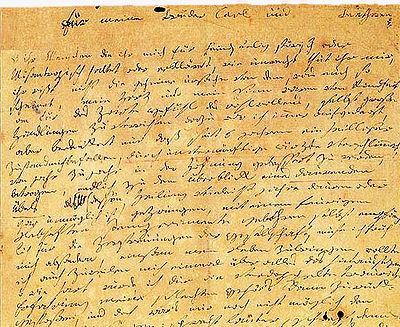
Heiligenstadt Testament
Encyclopedia

Ludwig van Beethoven
Ludwig van Beethoven was a German composer and pianist. A crucial figure in the transition between the Classical and Romantic eras in Western art music, he remains one of the most famous and influential composers of all time.Born in Bonn, then the capital of the Electorate of Cologne and part of...
to his brothers Carl and Johann at Heiligenstadt
Heiligenstadt, Vienna
Heiligenstadt was an independent municipality until 1892 and is today a part of Döbling, the 19th district of Vienna.Heiligenstadt is one of the 10 municipalities in the Döbling District.- Geography :...
(today part of Vienna) on 6 October 1802.
It reflects his despair over his increasing deafness and his desire to overcome his physical and emotional ailments in order to complete his artistic destiny. Beethoven kept the document hidden among his private papers for the rest of his life, and probably never showed it to anyone. It was discovered in March 1827, after Beethoven's death, by Anton Schindler and Stephan von Breuning, who had it published the following October.
A curiosity of the document is that, while Carl's name appears in the appropriate places, blank spaces are left where Johann's name should appear (as in the upper right corner of the accompanying image). There have been numerous proposed explanations for this, ranging from Beethoven's uncertainty as to whether Johann's full name (Nikolaus Johann) should be used on this quasi-legal document, to his mixed feelings of attachment to his brothers, to transference of his lifelong hatred of the boys' alcoholic, abusive father (ten years dead in 1802), also named Johann.

